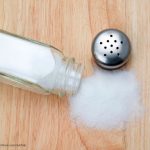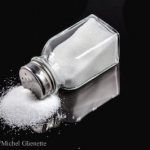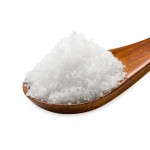According to The Guardian, sea salt around the world is contaminated with tiny bits of plastic. Research was conducted at the State University of New York at Fredonia. Sherri Mason, a professor at that facility told the Guardian, "Not only are plastics pervasive in our society in terms of daily use, but they are pervasive in the environment. Plastics are ubiquitous, in the air, water, the seafood we eat, the beer we drink, the salt we use - plastics are just everywhere." Researchers think the plastic in sea salt comes from microfibers and single-use plastics such as water bottles. Scientists studied 12 kinds of salt purchased in U.S. grocery stores. They found that Americans could be eating more than 600 particles of plastic every year in sea salt, and that's if they follow the … [Read more...]
How Much Salt Do You Really Eat?
The FDA is warning consumers that they may be consuming far more salt than they think. Even if you don't salt your food at the table or while cooking, you are probably consuming a lot of sodium, especially if you eat prepared or processed foods. Most of the sodium in the American diet comes from supermarket foods and restaurant meals. So the FDA is working to gradually reduce the amount of sodium that processors add to food. Draft guidance for industry has been released that sets voluntary goals for reducing sodium levels in processed and prepared foods. Note that their guidance is voluntary, which means that processors and restaurants do not have to abide by the levels. The maximum sodium intake per day for adults should be about 2,300 milligrams, which is the amount in a … [Read more...]
Chronic High Sodium Diet Associated with Hypertension
New research published in the America Heart Association's journal Circulation has found that in people who do not have high blood pressure (hypertension), a chronic high sodium diet is associated with the development of that disease. Researchers thought that a high sodium diet, over time, would cause damage to blood vessels in the endothelial layer. The study followed the sodium intake of 5,556 men and women in a city in the Netherlands as part of the PREVEND (Prevention of REnal and Vascular ENd stage Disease) study. They found that a diet sodium diet was associated with increases in two biomarkers that indicate endothelial dysfunction: serum uric acid (SUA) and urine albumin excretion (UAE). The endothelium in blood vessels is the thin layer of cells that line the interior surface. … [Read more...]
American Heart Association Proposes Change to Salt’s GRAS Status
The American Heart Association has commented on the FDA's proposal to reduce American consumer's sodium consumption with an interesting twist. That organization would like to see salt's status as a "safe ingredient" modified. The AHA would also like to see more limits put on the process that lets food companies make their own GRAS determinations. The GRAS List GRAS stands for Generally Regarded As Safe. That list of food additives was developed in 1958 as an amendment to the 1938 Federal Food, Drug, and Cosmetics Act. It distinguishes between new additives that need FDA approval before use, and additives and ingredients that have been used for years and are deemed safe "with a consensus of expert opinion" and "reasonable scientific certainty that the substance is harmless when used … [Read more...]
Nine in Ten U.S. Adults Consume Too Much Sodium
Almost all adult Americans consume too much sodium, according to a report from the Centers for Disease Control and Prevention. Ninety percent of the sodium in our diets comes from food, and the sodium we get from foods is concentrated in prepared foods and processed foods; it's not added at the table via the salt shaker. Most of us know that consuming too much sodium can contribute to diseases such as high blood pressure (hypertension). But there are some diseases linked to high sodium intake that may be surprising. Diabetes Gallbladder disease Heart disease Stroke Osteoarthritis Endometrial cancer Breast cancer Colon cancer Kidney disease Obesity Some scientists and doctors think that the ratio of sodium to potassium in your diet may be an even more … [Read more...]
New Research Finds Early Experience Shapes Salt Preference
Most of us know that we consume too much sodium. In fact, Americans consume about 3400 milligrams of sodium every day. The recommended daily limit is about 2300 milligrams. The body's actual requirement for sodium is only 220 milligrams a day. Most of the sodium in our diet comes from processed foods. Because salt is on the "Generally Regarded as Safe" (G.R.A.S.) list, producers can add as much salt as they want to processed foods. … [Read more...]







